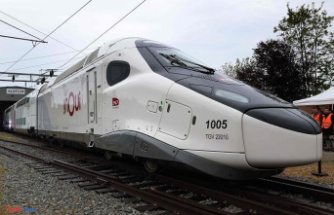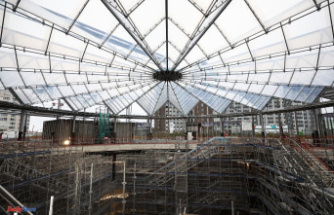Although this is putting additional strain on the economy, which is already in crisis, the ECB will probably raise interest rates again tomorrow. The central bank is threatening to exaggerate and exacerbate the crisis, some warn. Others are calling for further rate hikes until inflation is truly under control. The most important arguments for and against further interest rate hikes
Like other central banks, the European Central Bank (ECB) has increased its key interest rates at record speed in recent months. In doing so, it is reacting to the highest inflation rates in Europe since the introduction of the euro. For Germany it is even the highest for more than 70 years. But recently, inflation has weakened again. From October to November, prices in Germany stopped rising and actually fell in some euro countries. Producer prices, which usually run ahead of inflation, actually collapsed in Germany in November compared to the previous month. Economists now expect the inflation rate to fall from ten to a good seven percent in December.
At the same time, the outlook for European economic development in the coming months is bleak. Voices are therefore increasing calling for an end to interest rate hikes. Because higher interest rates continue to slow down the economy, inhibit investments and usually increase unemployment. Other experts and central bank representatives, on the other hand, are vehemently calling for further interest rate hikes until it is certain that inflation will fall back to the target value of two percent. It is considered certain that the Governing Council, chaired by the head of the central bank, Christine Lagarde, will decide to raise the key interest rate by at least 0.5 percentage points at its meeting tomorrow. Ntv.de summarizes the most important arguments for and against further interest rate hikes:
The crisis is getting worse
Higher interest rates increase the price of the capital that companies work with. This dampens economic activity. This is exactly what is wanted, because it reduces the demand for both capital and consumer goods. Among other things, this also costs economic growth and jobs. If central banks have to counteract the phases of an overheated economy and rising prices, that's not a problem. However, according to forecasts by economic research institutes, Germany and Europe are currently at the beginning of a recession. The Confederation of German Trade Unions (DGB), among others, is therefore calling for interest rate hikes to be stopped. "Further interest rate hikes could severely weaken the economy - rising unemployment and an increase in social hardship would be the result," warns DGB board member Stefan Körzell.
However, ECB boss Lagarde has already made it clear that she does not want to take the economic argument into account. On the contrary, she even warned the euro governments against stimulating the economy, as this would increase economic demand, which would have to be reduced in order to get the price increases under control.
Inflation drivers cannot be influenced by monetary policy
Opponents of further rate hikes, on the other hand, never tire of emphasizing that the current inflation was not triggered by excessive demand but by a shock in supply. The increases in energy prices triggered by the Russian attack on Ukraine and the subsequent sanctions and also the supply chain problems, which would have made many products scarce and thus more expensive, could not be effectively influenced by the central bank's monetary policy means.
Crisis throttles demand by itself
In addition, energy prices in particular have already fallen sharply again, and not as a result of the previous interest rate hikes by the central banks, but largely as a result of self-regulation by the market: the exorbitantly expensive energy has led to a global economic downturn, which has caused demand for crude oil to fall sharply, which is why the price of oil on the world market has fallen by around 40 percent from its high for the year at the beginning of March. This is already being felt by German consumers in the form of significantly falling fuel prices at filling stations.
No wage-price spiral in sight
A major concern at the beginning of the current rise in inflation was that inflation could take on a life of its own in the form of a wage-price spiral. However, at the end of the year there is still no sign of this. According to the Institute for Macroeconomics and Business Cycle Research (IMK), which is close to the trade unions, negotiated wages have only risen by an average of 2.7 percent in the current year. It is true that some of the most recent, mostly significantly higher wage settlements will not come into force until next year. Nevertheless, labor costs are clearly not one of the drivers of inflation.
Inflation has broadened
However, neither the absence of a wage-price spiral nor falling energy and raw material prices can calm supporters of further interest rate hikes. They point out that the prices of goods and services that are not directly related to energy prices have also risen recently. Core inflation, which does not include prices that are particularly susceptible to fluctuations, was most recently 5.0 percent in the euro area. While not as extreme as headline inflation, which is heavily driven by energy, it is well above the ECB's inflation target of 2 percent.
Neutral interest rate not yet reached
The ECB has recently raised interest rates faster than ever before. However, it also started from a historically low level. The European key interest rate, the main refinancing rate, is currently 2.0 percent. The deposit rate, which is also important, is slightly lower at 1.5 percent. This is still low compared to previous decades and compared to the US Federal Reserve, whose key interest rate is currently between 3.75 and 4.0 percent. Above all, the ECB assumes that its own interest rates have not yet reached the neutral level, at which they would neither stimulate nor slow down the economy. This means that the central bank is still stimulating the economy and thus demand. The central bankers definitely want to stop this in view of the current inflation rates.
Not the current inflation, the medium-term development counts
Monetary policy measures, i.e. primarily interest rate changes and bond purchases or sales, take effect with a time lag. According to various estimates, this is six months or more. This means that the current rate of inflation should not be decisive for the current interest rate decision, but rather the rate to be expected in the coming year. According to its current forecast, which has just been raised again, the ECB expects inflation to be well above the two percent target not only in the coming year, but also in the year after that. ECB chief economist Philip Lane, among others, has made it clear that further interest rate hikes are necessary to bring inflation back to the target value more quickly.
Expectations matter
Inflation expectations are considered to be one of the most important factors for the development of inflation, apart from energy prices, for example, which the central bank can hardly influence. If consumers and companies assume that prices will rise sharply in the future, they adjust accordingly and increase their wage demands or prices. A self-fulfilling prophecy. Surveys regularly conducted by the ECB show that European consumers expect inflation to fall soon but will remain above 2 percent in the medium term.
Some conclude from this that the ECB must demonstrate its determination with further significant interest rate hikes and continue to lower expectations. Others find these poll results reassuring as they point to a drop in expectations, which is likely to worsen as inflation is already falling.












